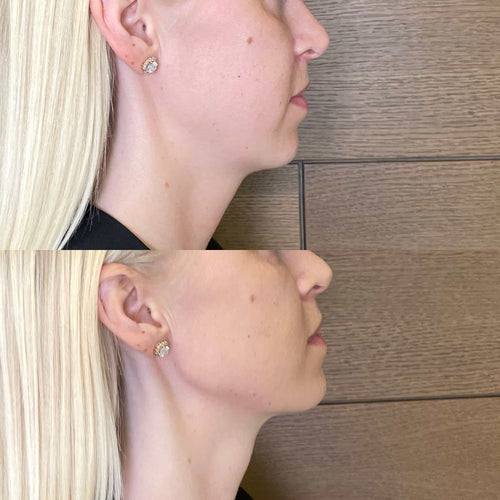Get Your Dermal Filler Consultation with Dr. Laura Geige
Individuals with Certain Medical Conditions
Blood Clotting Disorders
Individuals with certain medical conditions should exercise caution when considering lip fillers. Blood clotting disorders, for instance, pose a significant risk factor.
Lip fillers typically involve injecting hyaluronic acid, a substance that plumps and hydrates the lips. However, individuals prone to blood clots may experience complications like hematomas (collections of blood) or even embolisms (blockages in blood vessels).
Here’s a closer look at why blood clotting disorders make lip fillers potentially dangerous:
• Increased Risk of Bleeding: People with clotting disorders have difficulty forming clots, leading to prolonged bleeding after the procedure. This can result in swelling, bruising, and potential infection.
• Thrombosis Potential: In some cases, injected filler material can trigger clot formation within blood vessels, particularly if there are underlying conditions that contribute to thrombosis (clotting).
Book a Dermal Filler Appointment with Dr. Laura Geige Today
• Embolic Risk: A dislodged clot from the injection site could travel through the bloodstream and lodge in vital organs like the lungs or brain, resulting in serious complications.
If you have a blood clotting disorder, it’s crucial to consult your doctor before considering lip fillers. They can assess your individual risk factors and advise on the safest course of action.
Alternative options may be available, depending on your specific condition and desired outcome. Open communication with your healthcare provider is essential for making informed decisions about cosmetic procedures.
Active Infections or Skin Conditions
Individuals with certain medical conditions, active infections, or skin conditions should generally avoid getting lip fillers.
**Medical Conditions:**
People with autoimmune disorders like *lupus* or *rheumatoid arthritis* are at increased risk of complications from lip fillers. These conditions can cause the body to attack the filler material, leading to inflammation, pain, and swelling.
Blood clotting disorders can also make lip fillers unsafe. The injections carry a small risk of bleeding, which could be more serious for individuals with these conditions.
Those taking blood thinners should consult their doctor before getting lip fillers, as the medication can increase the risk of bruising and bleeding.
**Active Infections:**
Getting lip fillers while having an active infection in the area or elsewhere in the body can be dangerous.
The injection site could become infected, and the filler material itself could spread the infection.
It’s important to wait until any infections have completely cleared up before considering lip fillers.
**Skin Conditions:**

Certain skin conditions, like *active eczema* or *psoriasis*, can increase the risk of complications from lip fillers.
The injection site might be more sensitive and prone to irritation or allergic reactions.
Individuals with any of these conditions should consult with a qualified medical professional before getting lip fillers to discuss potential risks and alternatives.
People on Specific Medications
Blood Thinners
Lip fillers are a popular cosmetic procedure that can enhance lip volume, shape, and definition.
However, certain medical conditions and medications can increase the risk of complications associated with lip fillers.
Individuals taking *blood thinners* should consult their physician before undergoing lip filler injections.
Blood thinners, also known as anticoagulants, prevent blood clotting. While they are essential for treating or preventing blood clots, they can increase bleeding and bruising during and after the lip filler procedure.
Common types of *blood thinners* include:
* **Warfarin** (Coumadin)
* **Aspirin**
* **Heparin**
* **Clopidogrel** (Plavix)
Individuals taking these medications may experience prolonged bleeding, swelling, or hematoma formation after lip filler injections.
It is crucial for patients on *blood thinners* to discuss their medication regimen with a qualified healthcare professional before considering any cosmetic injectables, including lip fillers.
The physician can assess the individual’s risk factors and determine if it is safe to proceed with the procedure or recommend alternative options.
In some cases, the physician may advise temporarily stopping or adjusting the dosage of *blood thinners* under close medical supervision. However, this should only be done under the guidance of a healthcare professional, as abruptly discontinuing these medications can have serious consequences.
It’s important to prioritize safety and consult with a qualified medical provider before undergoing any cosmetic procedure while taking medications that affect blood clotting.
Isotretinoin (Accutane)
Isotretinoin (commonly known as Accutane) is a powerful medication used to treat severe acne. It works by reducing oil production in the skin and preventing clogged pores.
Individuals currently taking or who have recently taken isotretinoin should avoid lip fillers for several reasons:
-
Increased Risk of Complications: Isotretinoin can make the skin more fragile and susceptible to scarring. This increased fragility extends to the lips, raising the risk of complications like bruising, swelling, and infection following a filler injection.
-
Reduced Filler Effectiveness: Isotretinoin can affect collagen production in the skin. Collagen is essential for maintaining the structural integrity of the lips and supporting the longevity of fillers. Consequently, lip fillers might not last as long or provide the desired results in individuals on isotretinoin.
It’s crucial to discuss any cosmetic procedures, including lip fillers, with a dermatologist before starting or stopping isotretinoin treatment. They can assess your individual situation and advise on the best course of action based on your medical history and skin condition.
The general recommendation is to wait at least six months after completing isotretinoin treatment before considering lip fillers.
Arrange a Dermal Filler Consultation with Dr. Laura Geige
Prince and Flower Super Sleep Yoga Back to Work Experts Fringe Beverly Hills
- Who Is Jamie White-Welling: The Woman Behind Superman’s Story - May 24, 2025
- Upper Face Anti Wrinkle Treatment Near Farnham, Surrey - January 3, 2025
- Who Should Not Get Lip Fillers? - December 20, 2024
